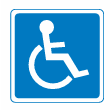Door Controls: Perfecting the Opening and Closing Cycle
Posted by Allegion on Aug 22nd 2024
In most applications, a pedestrian manually opens a door, and a door closer controls the speed and force with which the door shuts behind them. The power to close the door is generated by the springs inside the closer. Regulated hydraulic circuits control the speed of the door’s closing swing. An ideal door closing cycle can be achieved using one of the many LCN door closers available.
 |
Diagram: Main Stages in Correct Door Operation
|
Building Up Power to Close the Door
As a controlled door is opened, the spring of the closer is compressed, building up the power to close the door. Normally, more opening force would be required as spring compression increases. However, an LCN closer changes its arm geometry while the door opens, increasing the door leverage. This offsets the spring compression, resulting in greater ease in opening the door.
In Opening: More Leverage for the Person
The changing arm geometry increases leverage over the door to overcome the growing power of the spring, allowing one to pass through the door easily.
In Closing: More Leverage for the Closer
When the person releases the door and the closer takes over, spring power is applied through the arm system to close the door. As the door closes, the spring expands, providing the power to close the door.
Special Closers for Reduced Opening Force
The 1990 Americans with Disabilities Act (ADA) and ANSI Standard A117.1 describe maximum opening force limitations for certain non-fire rated doors. The last page of each closer section in the catalog includes a section titled "Reduced Opening Force Closers." This section lists closers in that specific series that comply with a maximum opening force based on the width of the door.
Any manual door closer, including those certified by BHMA to conform to ANSI Standard A156.4, that is selected, installed, and adjusted based on ADA or other reduced opening force requirements, may not provide sufficient power to reliably close and latch the door.
| Refer to the LCN Automatic Operators catalog for information on electric, pneumatic, and electromechanical systems that meet reduced opening force requirements without affecting closer power. |  |

